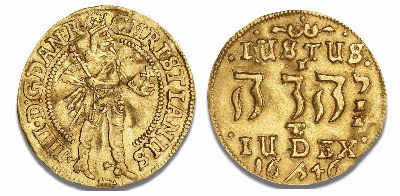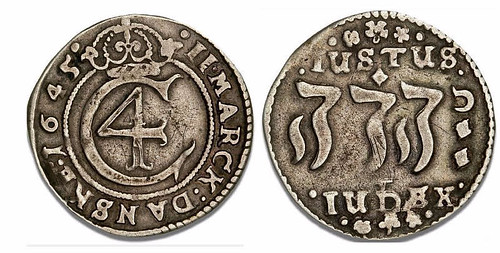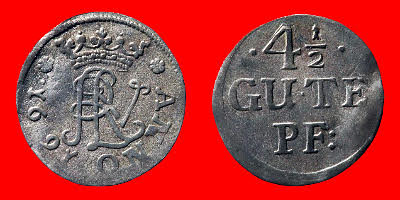
PREV ARTICLE
NEXT ARTICLE
FULL ISSUE
PREV FULL ISSUE
HOWARD BERLIN'S NUMISMATIC DIARY MARCH 19, 2017Numismatourist Howard Berlin is on the road again, this time in Germany. He submitted this report. Danke Schoen! -Editor
I had been in Hamburg (Germany) for a few days, planning to make a few day trips to two nearby cities/towns before traveling on to Schwerin, the capital of the German state of Mecklenburg-Vorpommern. On Tuesday I took a day trip to Glückstadt (“Fortune City”) on the shores of the Elbe River northwest of Hamburg. A few at my hotel would say, what’s there in Glückstadt?” a small town of about 12,000 people in the German state of Schleswig-Holstein, but was originally part of Denmark. I would tell them that this year is the 400th anniversary of the town founding by Denmark’s King Christian IV who reigned from 1603 to 1648, and was the first Danish king to establish connections with Jews. This happened because he needed a mintmaster to run the Mint in the newly planned town and, in 1619, Albert Dionis (Denis) was appointed to this post. Dionis, a Sephardi Jew, "of the Portuguese nation" as they came to be designated in Denmark, had settled in Hamburg in 1605 where he developed an extensive import-export business. Dionis thus became the first Jew to be issued a royal Danish letter of protection. The next was a day trip to Hannover (aka Hanover), the capital and largest city of the German state of Lower Saxony, and was once by personal union the family seat of the Hanoverian Kings of the United Kingdom (Niedersachsen). For example, George II was King of Great Britain and Ireland, Duke of Brunswick-Lüneburg, AND Prince-elector of the Holy Roman Empire from 1727 until 1760. Much of Hannover’s history is connected to the British Empire. My primary purpose in coming to Hanover was to see the coin cabinet of the Lower Saxony State Museum and meet with its curator. A few pictures:   These are two of the Danish coins issued during the reign of Christian IV with Albert dionis as the mintmaster. It is unusual in that on the coin’s reverse (back), there is the Tetragrammaton – the 4-letter Hebrew word of God’s name. The Tetragrammaton also appears on many early coins of Sweden. Although the Tetragrammaton was a prominent element on coins during the last four years of Christian IV’s reign, one thought it was due in part due to his Jewish mintmaster. Another thought is the king considered the Hebrew letters some sort of talisman of good luck symbol instrumental in helping him defeat Sweden in the two-year Kalmar War that ended in 1613.the gold coin is a 1646 1 ducat; the silver is a 1646 2 marks (12 marks equals 1 ducat). If you can get to Hamburg on Thursday March 23, you will be in time for a 5-course craft beer dinner (there’s five FOOD courses also, not just a 5-beer only dinner). Water is even included with the 55-euro ($58.40) price tag. This is being held at the hotel I usually stay at in Hamburg – the Reichshoff Hamburg, which is right across from the central train station.  If you collect coins AND drink beer (perhaps not at the same time), one of the many items on display in the Lower Saxony State Museum coin cabinet exhibit is was a coin that was called biermünze – beer coin. As the short version goes, four pennies (i.e., pfennige) was a common denomination then and was conveniently equal to the tax on a glass/tankard of beer. In the Duchy of Brunswick and Lüneburg, located in what was then southern Lower Saxony, the beer tax was raised to 4½ pennies and thus necessitated a new coin, nicknamed biermünze. Wayne Homren, Editor The Numismatic Bibliomania Society is a non-profit organization promoting numismatic literature. See our web site at coinbooks.org. To submit items for publication in The E-Sylum, write to the Editor at this address: whomren@gmail.com To subscribe go to: https://my.binhost.com/lists/listinfo/esylum All Rights Reserved. NBS Home Page Contact the NBS webmaster 
|